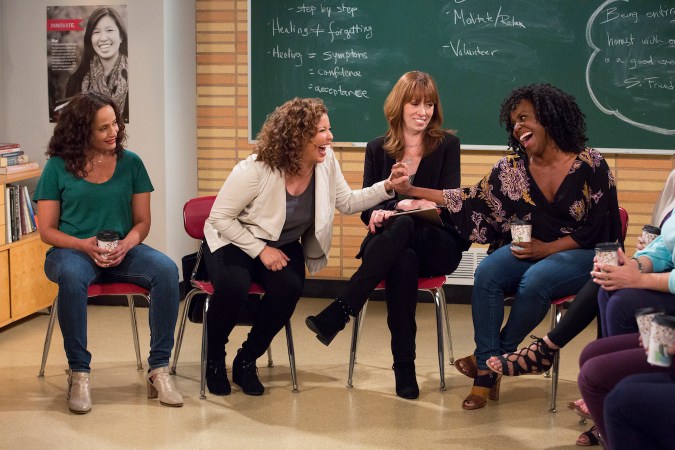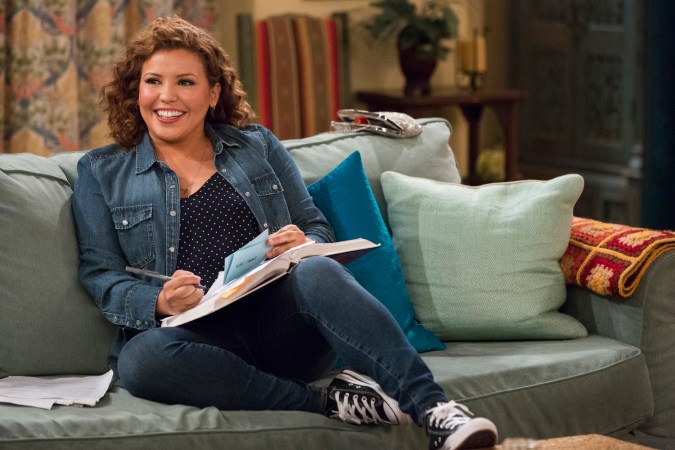After receiving critical acclaim for its premiere season last year, the original Netflix show One Day at a Time is back for Season 2 and sticking to the comedy-drama formula that worked so well for it the first time around. In fact, the three strong Latinas at the center of the groundbreaking TV series – Rita Moreno, 86, Justina Machado, 45, and Isabella Gomez, 19 – consider the opportunity to confront serious Latino issues a responsibility they all fully embrace.
Season 2 continues in that tradition of tackling tough topics right from the start, and does so with thoughtfulness, respect, pride and humor. Loosely based on the sitcom of the same name from 1975, the show follows the lives of a Cuban-American family living in Echo Park in Los Angeles. Penelope Alvarez (Machado) is a military veteran, nurse and single mother raising her teenage daughter Elena (Gomez) and son Alex (Marcel Ruiz) with help from her high-spirited mother Lydia (Moreno).
Early in the new season, the show takes on the critical issue of racism, when Alex is called a racial slur by a student from another school during a field trip and resorts to violence to settle the score. The second season also continues where it left off last season for Elena, who came out to her family and is now devoting much of her time to advocating for LGBTQ issues. The show skillfully weaves in topical political humor without getting too heavy handed, although, in real life, the female stars of the series seem like they wouldn’t mind hitting back even harder.
And, of course, the heartfelt emotion and wittiness of the comedy is evident throughout the series, too. In the first few episodes, the family embarrasses Alex at one of his baseball games for cheering too loudly and calling him by his nickname “Papito”; Lydia tries to understand why Elena wants to start a “gay club” at her school (“You’re here. You’re queer. We’re used to it. Move on.”); and kooky neighbor and family friend Schneider (Todd Grinnell) explains to Penelope why it’s OK to have casual sex.
During an interview with Remezcla earlier this week, Moreno, Machado and Gomez talked about why it’s uncalled for when Latinos shame each other because they don’t speak Spanish, what they think about the term “Latinx,” and how a TV series like One Day at a Time is using its platform to confront important Latino issues.
One Day at a Time Season 2 dropped January 26 on Netflix.
On Whether Latinos Who Don’t Speak Spanish Are Less Latino
Justine Machado: No, not at all.
Rita Moreno: No, of course not!
Machado: I think people who shame other people because of that should be ashamed of themselves. That doesn’t make a Latino – whether you speak Spanish fluently or at all. It goes deeper than that. It’s silly and superficial for people to say those things.
Moreno: [Being Latino] is about your character. It’s nice and complementary if you can speak the language and speak it really well like Isabella does, but if you don’t, it doesn’t make you less Latino.
Machado: Oh my God, yes. Isabella is the queen of the three of us and she’s the youngest! So, it’s not even generational. It’s about situations. Sometimes you don’t speak Spanish at home. You have to speak it in order to become fluent.

“My generation has a lot more fluidity in their gender and their sexuality.”
Moreno: You know what’s interesting is that my mother spoke English all the time. She talked like Lydia. She talked like ‘dees all dee time,’ but she talked in English. That’s how I was brought up. There was never any talk like, “You must only speak Spanish!” That was never discussed. I speak Spanish, but I’ve worked very hard to maintain the language because I don’t get to practice it enough. I have friends who are Latino, but guess what? They speak English! We’ll say, “OK, let’s make it a point to speak Spanish to each other,” but after a while Spanglish sneaks in. And then English sneaks in. It just happens.
On the Gender-Neutral Word Latinx
Moreno: As far as I’m concerned – and I come from another time – but I have no idea what the hell that means! What the hell is Latinx?
Machado and Gomez laugh.
Gomez: I think my generation has made a point of being very inclusive. We want everyone to feel accepted. More than that, we want to stop putting labels on each other. My generation has a lot more fluidity in their gender and their sexuality. So, I think a word like Latinx is really cool because it allows us all to just be people. We’re all Latinx. There’s definitely older generations that don’t get it and that’s fine.
Moreno: Isabella, I think that was beautifully articulated … and I still don’t get what Latinx is!

Machado: Hearing Isabella’s perspective, I am all for it. It’s something I didn’t understand at first either. I was like, “What is that?!” But I get it. It’s about being open and free. It’s about not being put in a box and not being labeled. Our whole lives, especially because we are women of color, we’re always being put in freaking boxes. I can understand wanting the freedom of that word.
Moreno: Did you just say freaking?
Machado: I did. Was that wrong? I could’ve have said fucking. Just kidding!
Moreno and Gomez laugh.
Machado: I was trying to keep it PG, Rita!
Moreno: As you can see, we really have a good time together. We laugh a lot! We are also extremely fond of each other.

On the Hardline Immigration Stance by the Trump Administration
Machado: I don’t think anything this administration is saying is worth talking about. I am opposed to this administration 100 percent.
Moreno: I agree. If it comes from this administration, then somewhere along the line there is a lot of hatred and disrespect for people of color and people of other nationalities. I don’t accept anything from them.
On the Responsibility of Confronting Latino Issues Head On
Moreno: I think [executive producer] Norman Lear decided when he put this show together that that’s precisely what this show was going to do. I do believe the man is a bit of a genius. I think he found it very important to bring this life we’re living in now into a show like this. The show balances it absolutely brilliantly. So, yes, I do think it has an obligation.
“We’re so grateful and honored to be able to change the Latino narrative and to be able to bring a different kind of family into your home.”
Machado: I think this show has a responsibility, but that’s something we’re happy about. This show – the crew, the cast, everyone behind it – welcomes that responsibility. It’s not anything that makes us feel burdened. We’re so grateful and honored to be able to change the Latino narrative and to be able to bring a different kind of family into your home that you might not necessarily think you have anything in common with. So, it’s a responsibility, but I think we’re all up for that.
Gomez: There’s just so much more color being incorporated into shows. [Studios] are finally realizing that TV should be a reflection of our country and our world. The industry is what provides entertainment for the world and everybody in the world sees what we produce in Hollywood. So, it’s not only our show that has a responsibility, but there’s a responsibility for all shows lucky enough to have a platform to be incorporating those kinds of things.

On What Someone Should Do if They’re on the Receiving End of a Racial Slur
Machado: I’ve been called those racial slurs before in Chicago. To me it was ridiculous and funny but only because I had such a strong foundation and knew they were the idiots. So, I would say it has nothing to do with you and everything to do with them. It’s their ignorance. That doesn’t take away the hurt or the embarrassment, but it’s not you. It sounds simple, but it’s true. If something like that happened to my child, I would definitely be at the school. I would be there as Justina confronting the situation, but not being confrontational.
Moreno: It’s very frustrating to that person [who said the racial slur] to not have a confrontation. By ignoring them, you’re depriving them of what they want. I love that.
Gomez: I feel like if someone is saying that to you on the street, they’ve already made up their mind about what they think. They’re not interested in getting to know you as a person. They’re there to cause harm. I feel like being confrontational at that point is not going to be a win for anybody. But you do have to confront the bigger problems. We can’t allow that behavior in our society.



